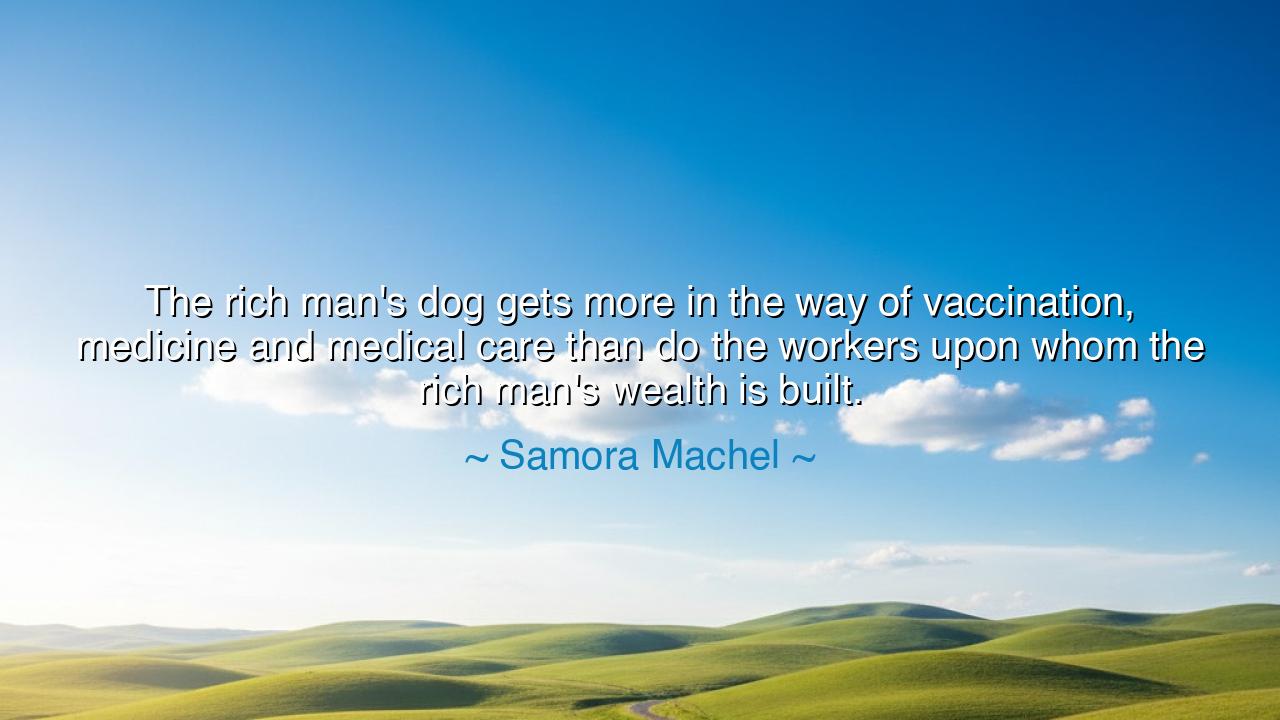
The rich man's dog gets more in the way of vaccination, medicine
The rich man's dog gets more in the way of vaccination, medicine and medical care than do the workers upon whom the rich man's wealth is built.






Hear the fiery words of Samora Machel, revolutionary and first leader of independent Mozambique, who declared: “The rich man’s dog gets more in the way of vaccination, medicine and medical care than do the workers upon whom the rich man’s wealth is built.” In this saying, the veil is torn from the face of injustice, and the world is forced to confront the cruel imbalance between luxury and survival. For what greater shame can there be than a society where the animal of the wealthy receives better protection from sickness than the human being whose sweat and toil sustain the wealth of the land?
The meaning of these words is clear and terrible: inequality in healthcare is not only a political failure, but a moral outrage. Machel, speaking from the struggles of Africa’s liberation movements, saw with his own eyes how colonial and capitalist systems exalted the lives of the rich while neglecting the poor who carried them. In the world he knew, the worker, the peasant, the builder of nations, was left to suffer without medicine, while the possessions of the rich were treated with reverence. Thus his words burn with the indignation of one who would not remain silent in the face of such betrayal.
History itself bears witness to the truth of his statement. In the early days of the Industrial Revolution, factory workers in Britain labored in dangerous conditions, plagued by disease and injury, with little to no access to doctors. Yet the wealthy, who feasted upon the fruits of these workers’ labor, spent fortunes on the care of their animals, their estates, and their pleasures. The laborers who built the cities and powered the machines were left to perish, while the dogs of the rich were groomed and healed. This is not only history, but a parable of injustice repeated across centuries and nations.
Machel’s words strike with deeper power because they expose the absurdity of misplaced value. When a society treasures property above people, when the health of animals is safeguarded more carefully than the health of the poor, it has turned its face away from humanity itself. The worker, who bears the burden of creation, is denied the fruits of dignity; the rich man, who profits from that labor, lavishes care upon what is secondary. Such a society is inverted, twisted, and doomed to unrest, for no structure can endure when its foundation—the people—are neglected.
Yet there is also in his words a call to awakening. Machel did not speak to sow despair, but to ignite resolve. If injustice has been built by human hands, it can also be dismantled by human hands. His message demands that we reorder our values: that those who sustain society with their labor must be the first to receive its care. Health, medicine, and dignity are not privileges for the few, but the rights of all. The revolution he led was not only for political independence, but for the restoration of this truth.
The lesson for us is plain: do not measure the greatness of a society by its wealth, its palaces, or its armies, but by how it treats its most vulnerable. Ask always: does the worker live with dignity? Does the poor man’s child receive the same care as the rich man’s pet? If the answer is no, then justice has not yet come. To honor the laborer, the farmer, the servant, and the builder is to honor the very roots of life itself.
And so, let your actions follow. Do not accept systems that exalt possessions over people. Demand fairness in healthcare, in labor, in the sharing of resources. Support those who work, who sweat, who sacrifice, for they are the pillars upon which nations stand. Let no dog of the rich man be more valued than the worker’s child. For in lifting the lowliest, we strengthen the whole, and in healing the least among us, we heal the heart of the world.
Thus remember always the words of Samora Machel: “The rich man’s dog gets more… than do the workers upon whom the rich man’s wealth is built.” Let them be a torch in your hand and a fire in your heart. For until the laborer is honored, society remains unbalanced, and until justice flows like water, we must not cease in the struggle for dignity and equality for all.






AAdministratorAdministrator
Welcome, honored guests. Please leave a comment, we will respond soon